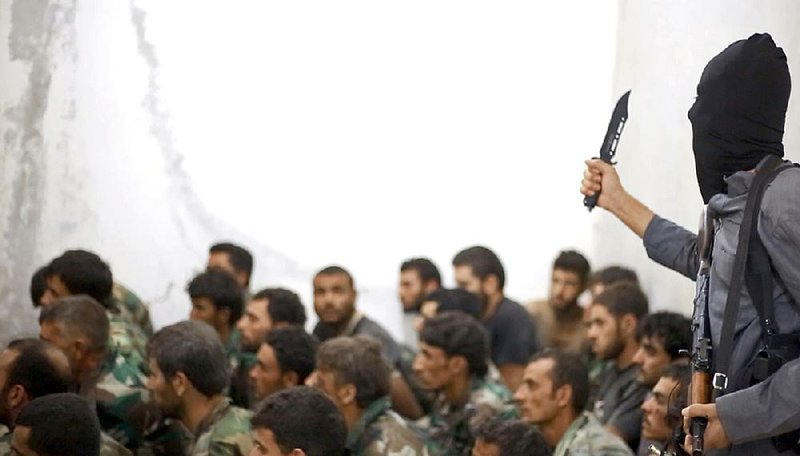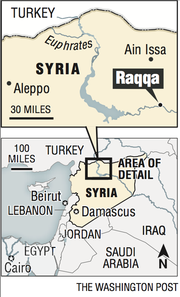BEIRUT -- Islamic State militants are stiffening their defenses in their de facto capital, Raqqa, Syria, as international airstrikes intensify in retaliation for the Paris attacks and downing of the Russian airliner. Islamic State fighters are hiding in civilian neighborhoods and preventing anyone from fleeing, former residents say.
RELATED ARTICLES
http://www.arkansas…">Cotton: Halt law on phone warrants http://www.arkansas…">8 nabbed in French raid http://www.arkansas…">ISIS threat pulls 2 closerhttp://www.arkansas…">White House threatens refugee-bill veto http://www.arkansas…">Arkansas opened arms to him, Syrian says http://www.arkansas…">Photo said to be of airliner bomb http://www.arkansas…">Honduras detains 5 Syrians who carried stolen passports
The city's estimated 350,000 people have been rattled by Russian and French airstrikes that shake the city daily. They also are worried they would be trapped with nowhere to go if U.S.-allied Kurdish and Arab forces in Syria invade the city, according to the former residents who have fled to Turkey and now report on events in Raqqa through acquaintances and activists inside.
For months, anti-Islamic State forces have been advancing toward Raqqa with backing from U.S.-led airstrikes, capturing Islamic State-held towns to the north and east of the city. After the Islamic State claimed responsibility for Friday's carnage in Paris that killed at least 129 people, there are calls for even stronger action in Syria.
Iraqi intelligence officials this week said the operation was planned in Raqqa, where the attackers were trained specifically for the operation with the intention of sending them to France.
U.S. Secretary of State John Kerry on Tuesday suggested Raqqa would be the new focus.
"My sense is that everybody understands that with Lebanon's attacks, with what's happened in Egypt, with Ankara, Turkey, with the attacks now in Paris, we have to step up our efforts to hit them at the core where they're planning these things," he said after his meeting Tuesday with French President Francois Hollande.
The city, which the extremist group has held since early 2014, lies on the Euphrates River at an intersection of major routes from all directions, most through agricultural areas crisscrossed by canals and tributaries of the river. The closest forces from the U.S.-backed Kurdish-Arab coalition, called the Democratic Forces of Syria, are 30 miles to the north in the town of Ein Issa.
The Raqqa activists say the militants have been stepping up defense of the city since late October, after the Democratic Forces started a campaign vowing to retake the city. Shortly afterward, the Islamic State banned people from leaving the city, and activists said it has stepped up enforcement of the ban in the past few days, leading to fears the group intends to use civilians as human shields in future fighting.
To avoid being hit in their bases, the fighters have moved into residential neighborhoods in houses abandoned by people who fled Raqqa earlier, an activist from Raqqa said, speaking on condition he be identified only by the name he uses in his political activism, Khaled, for security reasons.
"There is major fear in the city, especially with Daesh preventing civilians from leaving the city," Khaled said, using the Arabic acronym for the group.
Khaled, who now lives in Turkey, is in touch with people in Raqqa. Raqqa residents could not be reached directly because of an Islamic State ban on private Internet access across the city.
According to activists running the Raqqa is Being Slaughtered Silently Twitter account, the Islamic State has shut down Internet cafes as they look for people who report about Raqqa and the airstrikes.
Despite preventing residents from leaving Raqqa, dozens of families of Islamic State leaders were fleeing the city, headed to Mosul, the northern Iraqi city that Islamic State fighters seized more than a year ago, according to Rami Abdurrahman, head of the Britain-based Syrian Observatory for Human Rights, which tracks Syria's civil war through activists inside the country.
"The fleeing families are trying not to attract attention as they leave, avoiding traveling in convoys or placing too much luggage in their cars," said Abdurrahman. The Islamic State is "barring Syrian civilians from fleeing the city because it wants to keep up the impression it's still strong and to use them as human shields," he said.
"The civilians are very scared."
Among new measures that have been put in place by the Islamic State, according to several of the activists, is an order that extremist fighters move only in alleys and side streets to avoid detection from the air and not use vehicles at night.
On the roads leading into Raqqa, the extremists have dug extensive tunnels and trenches, said another activist from Raqqa, who spoke on condition of anonymity for fear of retaliation from the Islamic State. More recently, the militants placed tires filled with fuel on empty barrels around the city, with plans to ignite them in case of an attack to cloud the skies with smoke.
Anti-Islamic State forces are now marching south toward the city of Shaddadeh, an Islamic State stronghold 90 miles east of Raqqa, Kurdish activist Mustafa Bali said. Once that is taken, they will head east toward Raqqa through the Abdul-Aziz Mountain, as well as from Ein Issa and Soureen to the north and northwest of Raqqa.
He said liberating Raqqa would be a major blow and "mark the beginning of the end of Daesh in Syria," and he called for greater international support for the Kurdish-Arab coalition. But a campaign on Raqqa by the lightly armed forces would be costly, even with an intensified air campaign, he said.
"I believe it is going to be a major and long war."
Information for this article was contributed by Bassem Mroue and Zeina Karam of The Associated Press and by Donna Abu-Nasr and Henry Meyer of Bloomberg News.
A Section on 11/19/2015


